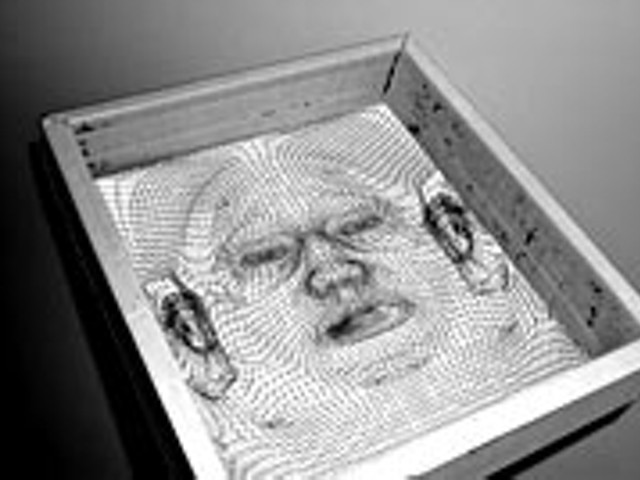My relationship with Goya was different. He loved the Duchess of Alba. The reality that it was just I lying on his drapery made him angry. He wanted her nakedness on his canvas. But she was of gold and finery, so Goya had to paint her with ornamental hairnets, braids and veils. Not me. I was a maja. I was granted emotion. I did not pose. I was not standing stiffly with my family behind something that suggested my magnificence. I was placed in scenes: countrysides, beds, selling oranges, dying — I was never stagnant.
In the afternoons, we would entangle ourselves in the ochre drapery of his studio and pretend to love one another. I would speak to him as though he was Manuel. Goya of course, could not hear me. He just whimpered softly. When we were through, we would stand up and resume our positions. He, clothed at his easel and I, naked, spread to absorb. He would become angry "Mierda!" Lying together messed up the fabric, and the reflections of light were no longer the same.
Sometimes, I would yell at him. I could do this while lying there, on his drapery, in the sunlight. My black hair was loose, spread all over the pillow and my hands behind my head. I would lie slightly to the right side with my knees together and my breasts touching. While my body was calm. and still, I would yell about life. I would scream that I was maja, a mistress, to my lover. I screamed because I could never be more. Goya kept on painting. Once, when we were taking a break, he whispered in my ear that he knew. Although he could not hear, he understood. He had seen inquisitions, war ... death ... betrayal. Sometimes, we would cry together. One afternoon, he pulled out the plates for his Tauromaquia etchings and softly mumbled to himself That day I was quiet, but he was not. He took the plates and made them scream. He broke them so they could never be reproduced. Despair carved into metal shattered everywhere. Then we went and lied together on the heavy fabric.
Sometimes King Charles would come into Goya's studio and demand for him to paint something. It would be a subject that Goya hated — boring and emotionless. But the king had made Goya the first court painter after his Los Caprichos series, and it was an offer Goya couldn't turn away. The king would speak loudly, rudely, into Goya's ear.
"I want you to paint Sabasa Garcia for the foreign minister. And Therese-Louise de Sureda for the chief of the royal porcelain works."
Goya would pretend that he didn't understand. The king would just speak louder.
One day while I was laying there, on the drapery, the king barged in. All previous requests were to be halted and Goya was to devote all his time to a painting of the Countess of Chinchon — my lover's future bride. I tore up from my position — exposed, vulnerable — and ran to the king. He looked at me and spit.
"Puta! You are a maja and nothing more." Then he turned his eyes to Goya. The sunlight caught in their prism and for a suspended moment they became the air on a simple blue day. Then, they turned back to stone and he stormed out. I walked back to my spot. Toward the drapery, there was a large canvas. It was a scene after a battle. I was there, lying in the street, dead. Surrounding me was a circle of women, bare and broken — they were mourning for me.
Return to the Summer Fiction index. Morgan Frances Campbell lives in Huntington Woods. E-mail comments to





